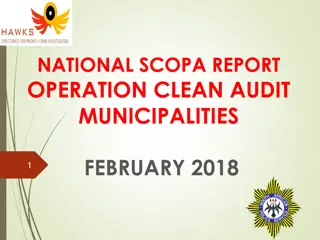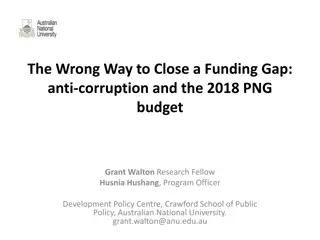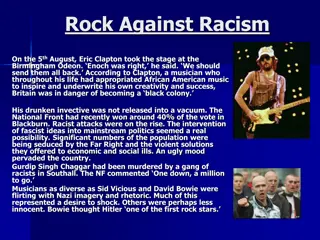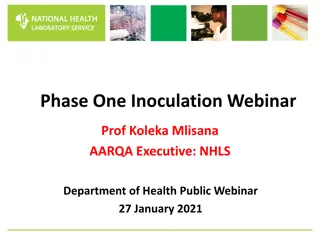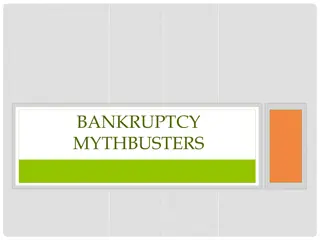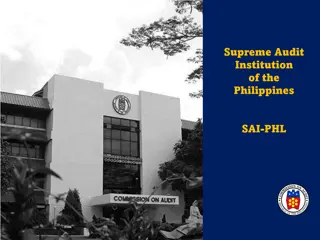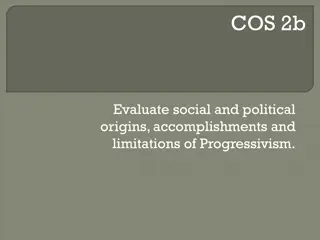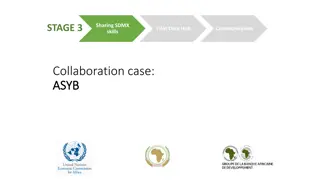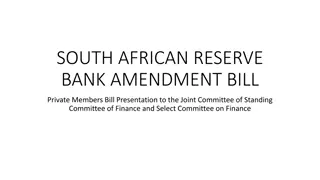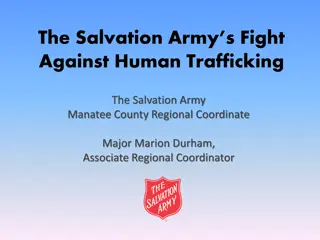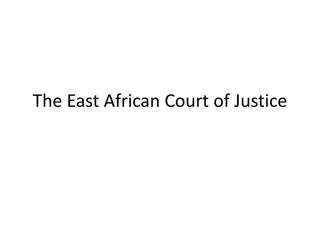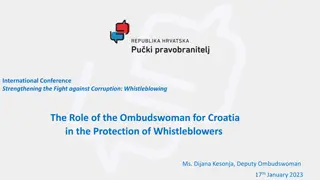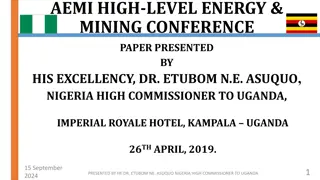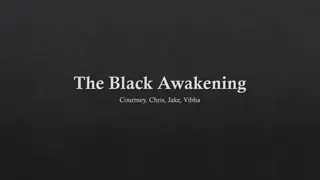The Fight Against Corruption and African Myths in Review at TUEFA Conference
Prof. PLO Lumumba delivered a compelling speech addressing corruption and African myths at the TUEFA Conference in Nairobi. The presentation highlighted the cultural and colloquial definitions of corruption, emphasizing its widespread impact in Africa. The origins and causes of corruption in Africa were also explored, shedding light on historical, institutional, and leadership factors contributing to this social epidemic.
Download Presentation

Please find below an Image/Link to download the presentation.
The content on the website is provided AS IS for your information and personal use only. It may not be sold, licensed, or shared on other websites without obtaining consent from the author. Download presentation by click this link. If you encounter any issues during the download, it is possible that the publisher has removed the file from their server.
E N D
Presentation Transcript
THE FIGHT AGAINST CORRUPTION AND THE AFRICAN MYTHS PRESENTED AT THE TRADE UNION FEDERATION OF EASTERN AFRICA (TUEFA) CONFERENCE AT NAIROBI, KENYA DATED 14THDAY OF AUGUST, 2018 By Prof. PLO Lumumba, LL.D, D.Litt (hc), FCPS (K), MKIM Advocate of the High Courts of Kenya and Tanganyika
CORRUPTION CULTURALLY AND COLLOQUIALLY DEFINED Various languages explain corruption in its various permutations. For example, in Kenyan Kiswahili corruption is described as chai or kitu kidogo , the Italian spintarella (meaning a little push ), Greek fakelaki ( a little envelope ), French pot-de-vin ( a glass of wine ), Chinese chaqian ( tea-money ), Portuguese gaseoso ( soft drink ), Spanish mordida ( a bite ), Egyptian ashaan ad- dukhaan ( something for your cigarettes ), and Syrian finjaan ahwa ( a cup of coffee ) all suggest payments that are quite small and not too serious violations. In contrast, the Slovak pod stolom ( under the table ), the Korean noemul ( giving goods in secret ), and Japanese kuroi kiri ( black mist ) all suggest something much more sinister. Of course everything is relative what appears relatively innocuous to one person may be quite sinister to another!
A. INTRODUCTION Without doubt, corruption has permeated the African society and anyone who can say that corruption in Africa has not become alarming is either a fool, a crook or else does not live in this continent . -Chinua Achebe, The trouble with Nigeria- Corruption is worse than prostitution. The latter might endanger the morals of an individual, the former invariably endangers the morals of an entire country. Karl Kraus, Australian satirist, 1874-1936, cited by E Campos & B Bhargava (2007) Tackling A social Pandemic in E Campos & S Pradhan (2007) The Many Faces of Corruption: Tackling Vulnerabilities and the Sector Level. World Bank.
B. ORIGINS OF CORRUPTION Just as it is impossible not to take the honey (or the poison) that finds itself at the tip of the tongue, so it is impossible for a government servant not to eat up at least a bit of the King's revenue. Just as fish moving under water cannot possibly be found out either as drinking or not drinking water, so government servants employed in the government cannot be found out (while) taking money (for themselves). Kautilya, the Chief Minister to the king in ancient India, in his writing Arthasastra wrote in the fourth century.
C. CAUSES OF CORRUPTION IN AFRICA 1) The negative colonial legacy 1) Weak institutions of governance 2) Lack of accountability and transparency 2) Poor leadership 3) Politics of the belly 3) Lack of political will 4) Omnipotent state 4) Weak ethical values 5) Centralist nature of the state and concentration of state power 5) Greed and selfishness 6) Clientelism and patronage nepotism 6) Weak judicial system and 7) Absence of popular participation of the public in government 7) Constant insecurity and conflicts.
D. Effects of Corruption in The Continent In the words of Kofi Annan, the former United Nations Secretary General: The words of Hugh Bayley succinctly captures the effects of corruption in Africa, he says: Corruption undermines economic performance, weakens democratic institutions and the rule of law, disrupts social order and destroys public trust, thus allowing organised crime, terrorism and other threats to human security to flourish And it is always the public good that suffers. Corruption is bleeding Africa to death and the cost is borne by the poor. Some estimates put money corruptly leaving the continent at greater than that arriving as aid. Much of the money is banked in Britain or our overseas territories and dependencies and sometimes British citizens or companies are involved in corrupt deals. We want our government to get tough on corruption.
E. METAPHPORS ON CORRUPTION IN AFRICA You eat where you work Where an official: decides to locate a development project in an area where his friends and supporters live ; gives a job to someone from his family who does not have adequate qualifications ; and demands a favour or an additional payment for some service that is part of his job . Money for tea The universal popularity of tea and coffee as metaphors for bribes points to another way euphemisms function to conceal the true nature of a corrupt transaction. If you are stopped by traffic police in North Africa the officer may well ask you to sponsor his next cup of kahwe , or coffee. In Kenya you might be stopped by traffic policemen and asked to contribute to tea for the elders .
Under the table The well-known English phrase describing money being passed under the table , eg in Nigeria and Kenya oiling money is paid to officials to grease the wheels of bureaucracy, while most Africans have developed the culture of puting something on the palm of an official s hand in order to move things along. Something small (Kitu Kidogo) Many euphemisms of corruption and bribery work to deflect attention from the action or minimise its importance. The Swahili expression for something small is a good example of this. In Ivory Coast the police used to ask for the cost of a drink, comparing the size of the bribe to that of a small tip. A fish starts to stink at the head The phrase a fish starts to stink at the head reminding us that petty bribes at street-level are often matched by greater corruption at the top of organisations and institutions. African officials looking to earn a kickback for arranging a business deal will demand they are given a cut
MYTH 1: THE SIZE OF SMALL-SCALE CORRUPTION IS SMALL In various countries around the world, having to pay an official to access the public health system, police services or education can be a daily occurrence. These kinds of payments pose a financial burden on individuals, particularly the poor who not only lose a larger share of their income to bribery than wealthier people, but are twice as likely to be asked to pay a bribe. MYTH 2: CORRUPTION HAS AN INSIGNIFICANT IMPACT ON HUMAN DEVELOPMENT Where corruption is prevalent, levels of human development tend to be lower. Research shows that in countries where bribery is common, progress in meeting the Millennium Development Goals is slower and more people lack basic services. MYTH 3: CORRUPTION DOESN T AFFECT INEQUALITY Corruption exacerbates the gap between the rich and poor. It creates a political and social system that favours the wealthy and well-connected which, in turn, perpetuates inequality.
MYTH 4: CORRUPTION IS GOOD FOR ECONOMIC GROWTH Corruption also deters investment and puts off businesses; bribery undermines businesses productivity more than bureaucracy. Corruption is therefore economically inefficient for companies. MYTH 5: CORRUPTION HELPS OVERCOME GOVERNMENT INEFFICIENCY Corruption undermines the integrity of regulation as it allows corrupt politicians to manipulate the regulatory environment for their own benefit. Studies show that corruption creates incentives for politicians and public officials to set up more regulations in order to have more opportunities to extort payments. Corruption also undermines the rule of law and corrodes public confidence in the state and the legitimacy of the political system. A culture of bribery demonstrates to the public that the rules are not applied consistently in line with the law. Transparency international https://www.transparency.org/news/feature/five_corruption_myths_that_block_progress
Myth #1: Governance and anticorruption are one and the same. We define governance as the traditions and institutions by which authority in a country is exercised for the common good. This includes the process by which those in authority are selected, monitored, and replaced (the political dimension); the government s capacity to effectively manage its resources and implement sound policies (the economic dimension); and the respect of citizens and the state for the country s institutions (the institutional respect dimension). By contrast, corruption is defined more narrowly as the "abuse of public office for private gain." Myth #2: Governance and corruption cannot be measured. It is true that less than a dozen years ago virtually no internationally comparable measures of governance or corruption existed. But in recent years, the World Bank and others have sought to remedy this. At the World Bank, we have constructed aggregate governance indicators that cover more than 200 countries, based on more than 350 variables obtained from dozens of institutions worldwide. Their indicators cover the following six dimensions of governance: voice and accountability; political stability and the absence of major violence and terror; government effectiveness; regulatory quality; rule of law; and control of corruption.
Myth #3: The importance of governance and anti-corruption is overrated. Thanks to these and other advances in empirical measurement, a number of researchers have examined the impact of governance on development. The research generally shows that countries can derive a very large "development dividend" from better governance. We estimate that a country that improves its governance from a relatively low level to an average level could almost triple the income per capita of its population in the long term, and similarly reduce infant mortality and illiteracy. Myth #4: Governance is a luxury that only rich countries can afford. Some claim that the link between governance and incomes does not mean that better governance boosts incomes, but the reverse higher incomes automatically translate into better governance. It is misleading to suggest that corruption is due to low incomes, and invent a rationale for discounting bad governance in poor countries. In fact, the evidence points to the causality being in the direction of better governance leading to higher economic growth. A number of emerging economies, including the Baltics, Botswana, Chile, and Slovenia, have shown that it is possible to reach high standards of governance without yet having joined the ranks of wealthy nations.
Myth #5: It takes generations for governance to improve. While it is true that institutions often change only gradually, in some countries there has been a sharp improvement in the short term. This defies the view that while governance may deteriorate quickly, improvements are always slow and incremental. Myth #6: Donors can "ringfence" projects in highly corrupt countries and sectors. With the possible exception of some humanitarian aid projects, the notion that the aid community can insulate projects from an overall corrupt environment in a country is not borne out by the evidence. The data suggest that when a systemic approach to governance, civil liberties, rule of law, and control of corruption is absent, the likelihood of an aid-funded project being successful is greatly reduced. Myth #7: Fight corruption by fighting corruption. A fallacy promoted by some in the field of anticorruption, and at times also by the international community, is that one "fights corruption by fighting corruption" through yet another anticorruption campaign, the creation of more "commissions" and ethics agencies, and the incessant drafting of new laws, decrees, and codes of conduct. such initiatives appear to have little impact, and are often politically expedient ways of reacting to pressures to do something about corruption, substituting for the need for fundamental and systemic governance reforms.
Myth # 8: The culprit is the public sector in developing countries. A common fallacy is to focus solely on the failings of the public sector. The reality is much more complex, since powerful private interests often exert undue influence in shaping public policy, institutions, and state legislation. Many multinational corporations still bribe abroad, undermining public governance in emerging economies. There are also weaknesses in the nongovernmental sector. Further, traditional public sector management interventions have not worked because they have focused on technocratic "fixes," often done through technical assistance importing hardware, organizational templates, and experts from rich countries. Myth #9: There is little countries can do to improve governance. Given the long list of interventions that have not worked, as well as the role often ascribed to historical and cultural factors in explaining governance, it is easy to fall into the pessimist camp. That would be a mistake. there are strategies that offer particular promise. The coupling of progress on improving voice and participation including through freedom of expression and women s rights with transparency reforms can be particularly effective. http://www.worldbank.org/wbi/governance/
H. REDRESS MECHANISMS IN PROMOTING BUSINESS ETHICS AND FIGHTING CORRUPTION i) Reenergizing the fight against corruption the African continent Declare corruption a national disaster Generate and demonstrate sufficient political will to tackle corruption Strengthen the policy, legal and institutional framework to fight Corruption Cleaning up the Political party system and machinery: the power of setting an example Increase transparency, access to information The importance of life-style audits and barring corrupt officials and business Protection of whistle-blowers, witnesses and anticorruption fighters Increase citizen activism and engagement in the fight against corruption Set up independent anti-corruption institutions across the continent Foster values that reject corruption Introduce merit into political system De-ethnicise and de-racialise the corruption debate
ii) Widen and Deepen Anti-Corruption and Governance Reforms across the Continent Some of the practical approaches and strategies would include the following: 1) Governance Structure 2) Policy Reforms 3) Legislative and Institutional Reforms 4) Political Reforms 5) Establishment of Institutions Promoting Good Governance 6) Public Service Reforms 7) Citizen Empowerment and Participation 8) Civil Society Activism 9) International Co-operation 10)Stakeholders Synergy
SUMMARY REDRESS MECHANISMS IN PROMOTING BUSINESS ETHICS AND FIGHTING CORRUPTION 1)Widen and Deepen Anti-Corruption and Governance Reforms across the Continent 2)Reenergizing the fight against corruption the African continent 3)Role of ICT in Abetting Crime 4)Disparate Anti-Corruption Legal Frameworks in African Countries 5)Disparate Institutional Capacities 6)Success of Cooperation in other Jurisdictions
I. MECHANISMS FOR COOPERATION IN FIGHTING CORRUPTION a)Law Enforcement Cooperation b)Experience & Information Sharing c)Staff Training d)Joint Operations e)Establishment of Specialized Cooperation Units f) Joint Secretariat
J) BENEFITS OF AFRICAN UNITY IN FIGHTING CORRUPTION Some of the benefits that Africa stands to benefit by mobilising in the war against corruption include; Synergy: When two or more agents or forces cooperatively interact or combine their efforts, the effect is greater than the sum of their individual effects. Harmony: Cooperation ensures that efforts towards the same goal are not duplicated. Speed: The investigation ofcomplex cases of corruption, especially those involving cross border transactions would be expedited through cooperation mechanisms. Deterrence: Cooperation in law enforcement increases the certainty of detection and punishment of offenders, which is a key deterrent to potential offenders. Conflict Resolution: Many studies undertaken on corruption have always drawn a link between corruption and conflict, especially in Africa. Effectively combating corruption could be a crucial step towards establishing permanent peace in the Continent
K) CONCLUSION It cannot be gainsaid that the corrosive effect of corruption needs urgent and sustained action which demands that Africa strengthens governance as a way of curbing systemic corruption.


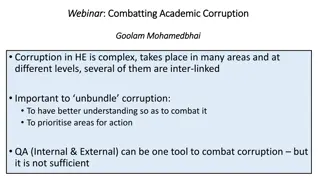
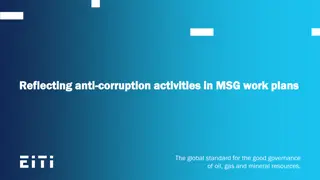

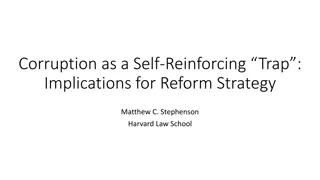
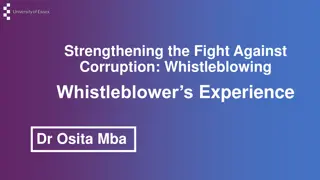
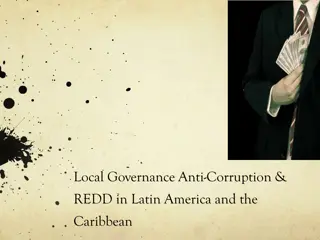
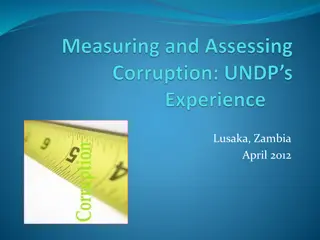
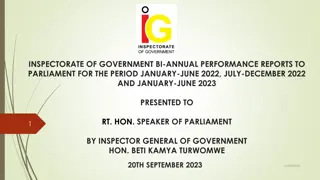
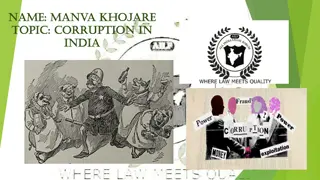
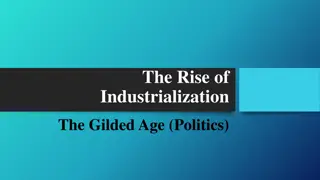
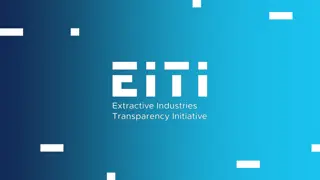
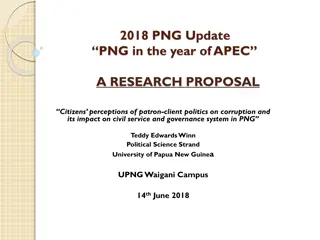
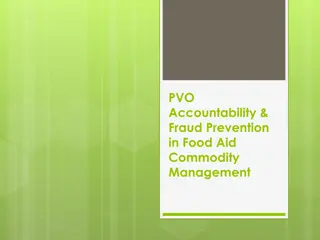
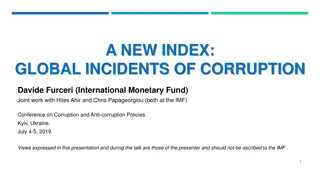
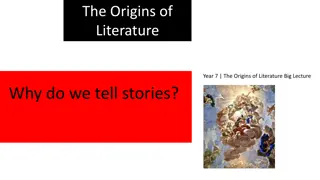

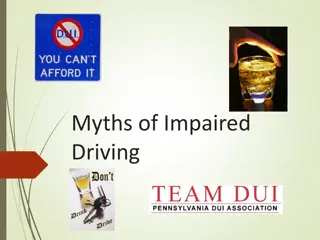

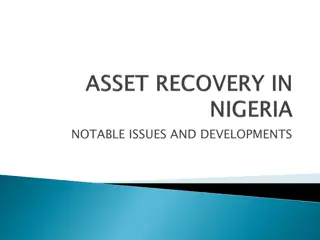
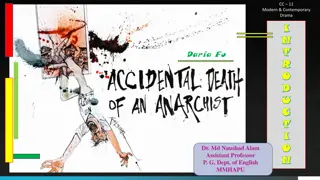
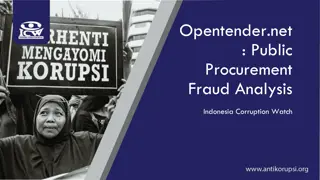

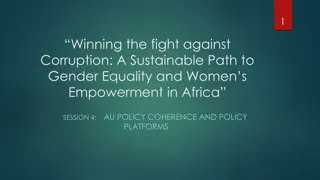
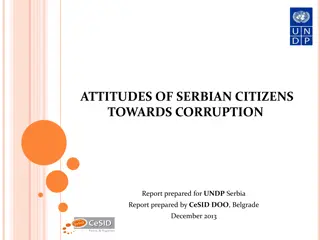

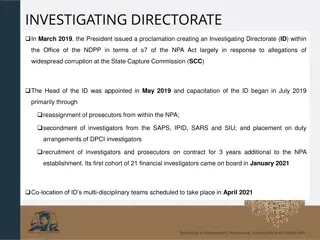
![Comprehensive Overview of Corruption Watch Submission on Public Procurement Bill [B18B-2023]](/thumb/138344/comprehensive-overview-of-corruption-watch-submission-on-public-procurement-bill-b18b-2023.jpg)
